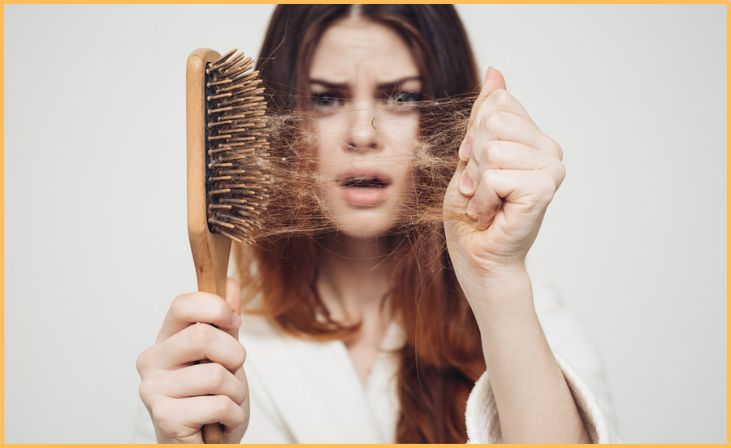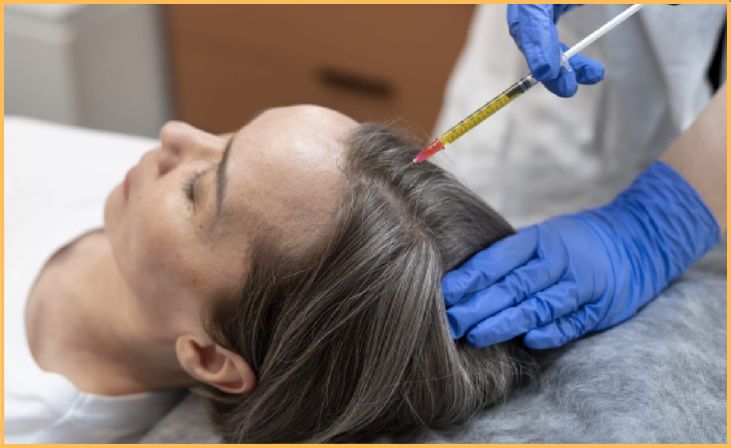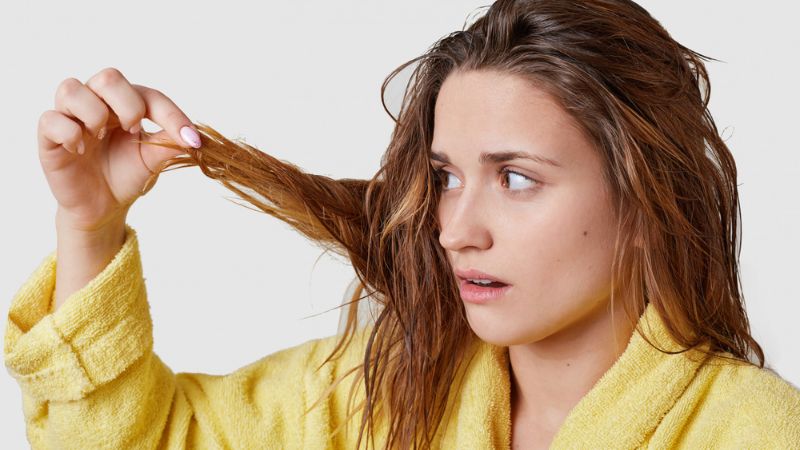Dealing with hair loss can be a challenging experience for many. Whether it’s caused by genetics, lifestyle choices, or environmental factors, the desire to regrow thinning hair is universal. However, the good news is that there are effective strategies to combat hair loss and stimulate regrowth. In this comprehensive guide, we’ll explore various approaches, from lifestyle changes to advanced treatments, offering a roadmap to reclaiming a fuller, healthier head of hair. Understanding the causes and implementing targeted solutions can empower individuals in their quest to combat hair loss and promote regrowth, fostering a sense of control and confidence.
So let’s explore effective strategies, lifestyle changes, and holistic approaches to combatting hair loss and promoting regrowth.
Understanding Hair Loss

Genetic Predisposition:
- Inherited Traits: Genetics play a significant role in determining hair loss patterns. Individuals with a family history of hair loss, especially from either parent’s side, may be genetically predisposed to thinning hair.
- Hormonal Influence: Genetic factors can impact hormone levels, leading to conditions such as androgenetic alopecia, a common form of genetic hair loss.
Lifestyle Choices:
- Dietary Habits: Poor nutrition, including deficiencies in vitamins and minerals essential for hair health, can contribute to hair loss. A balanced diet rich in nutrients supports the overall health of hair follicles.
- Styling Practices: Excessive heat, chemical treatments, and tight hairstyles can damage hair follicles, leading to breakage and thinning.
Environmental Stressors:
- Pollution: Exposure to environmental pollutants can harm hair follicles, affecting their health and contributing to hair loss.
- Stress: Chronic stress can trigger hormonal imbalances that impact the hair growth cycle, leading to increased shedding and thinning.
Guide Approach to Address Hair Loss Concerns:

Holistic Understanding:
- Comprehensive Assessment: Begin by understanding your unique combination of genetic, lifestyle, and environmental factors contributing to hair loss. This holistic assessment forms the foundation for an effective strategy.
Healthy Lifestyle Practices:
- Balanced Nutrition: Adopt a nutrient-rich diet, incorporating foods high in vitamins, minerals, and proteins crucial for hair health. Consult a nutritionist if needed.
- Gentle Hair Care: Implement gentle hair care practices, avoiding harsh chemicals and minimizing heat styling to reduce stress on the hair shaft.
Professional Guidance:
- Dermatologist Consultation: If genetic factors or sudden hair loss are concerns, seek professional advice. Dermatologists can diagnose the specific type of hair loss and recommend targeted treatments.
- Tailored Solutions: Professionals may recommend medications, topical treatments, or advanced procedures like PRP therapy based on individual needs.
Mind-Body Connection:
- Stress Management: Incorporate stress-reducing activities such as meditation, yoga, or regular exercise to maintain a healthy mind-body balance, positively impacting hair health.
By addressing these factors and adopting a comprehensive approach, individuals can better navigate the complexities of hair loss, promoting a healthier and fuller head of hair over time.
Quick Link: 10 Best Chic Haircuts That Will Always Be in Style
Importance of a Healthy Diet
Iron:
- Role in Hair Growth: Iron is crucial for the proper functioning of hair follicles and the hair growth cycle. An adequate iron supply ensures optimal oxygen delivery to the hair roots.
- Food Sources: Include iron-rich foods such as lean meats, beans, lentils, spinach, and fortified cereals in your diet.
Protein:
- Building Blocks of Hair: Hair is primarily composed of a protein called keratin. Consuming sufficient protein is essential for the growth and repair of hair strands.
- Food Sources: Incorporate protein-rich foods like lean meats, fish, eggs, dairy products, legumes, and nuts into your meals.
Vitamins A, C, and D:
- Vitamin A: Supports the production of sebum, the natural oil that keeps the scalp moisturized.
- Vitamin C: Aids in the absorption of iron and promotes collagen production, vital for hair structure.
- Vitamin D: Contributes to hair follicle health and the regulation of hair cycling.
- Food Sources: Include carrots, sweet potatoes, citrus fruits, leafy greens, fatty fish, and fortified dairy products in your diet.
Omega-3 Fatty Acids:
- Scalp Health: Omega-3s nourish the hair follicles and contribute to a healthy scalp, reducing inflammation.
- Food Sources: Incorporate fatty fish (salmon, mackerel), chia seeds, flaxseeds, and walnuts into your diet.
Establishing Healthy Dietary Habits for Hair Health:

Balanced Diet:
- Varied Food Choices: Ensure a diverse and balanced diet to cover a spectrum of nutrients crucial for hair health.
- Hydration: Drink an adequate amount of water to maintain overall hydration, benefiting both hair and scalp health.
Supplementation:
- Consultation with Professionals: If it’s challenging to meet nutritional needs through diet alone, consider consulting with a healthcare professional or nutritionist for targeted supplements.
Avoid Excessive Dieting:
- Impact on Hair: Severe calorie restriction or extreme diets can lead to nutrient deficiencies, adversely affecting hair health.
- Sustainable Choices: Opt for sustainable and balanced eating habits that support overall well-being.
By prioritizing a nutrient-rich diet, individuals lay the groundwork for healthy hair. These dietary choices not only combat hair loss but also contribute to the promotion of regrowth, fostering a vibrant and resilient mane over time.
Gentle Hair Care Practices

Protecting Your Hair through Gentle Care Practices:
Harsh Treatments:
- Chemical Processes: Excessive use of chemical treatments, such as perms, relaxers, or frequent coloring, can weaken the hair shaft and contribute to breakage.
- Overexposure: Limiting the frequency of these treatments and allowing adequate time between sessions helps prevent overexposure.
Excessive Styling:
- Heat Styling: Regular use of hot styling tools like straighteners and curling irons can lead to dryness and damage. Use heat protectant products and consider reducing the frequency of heat styling.
- Tight Hairstyles: Pulling hair tightly into ponytails, braids, or buns can cause stress on the hair shaft, leading to a condition known as traction alopecia. Opt for looser styles to minimize strain.
Gentle Hair Care Routine:
- Mild Shampoos and Conditioners: Choose products that are gentle, sulfate-free, and formulated for your specific hair type. Avoiding harsh chemicals helps maintain the natural moisture balance of the hair.
- Regular Conditioning: Use a conditioner to keep the hair hydrated and manageable. Deep conditioning treatments can be beneficial, especially for damaged or dry hair.
Proper Detangling:
- Wet Hair Care: Handle wet hair with care as it is more prone to breakage. Use a wide-toothed comb to detangle gently, starting from the tips and working your way up.
- Preventive Measures: Applying a leave-in conditioner or detangling spray before combing helps minimize friction and reduces the risk of breakage.
Protective Hairstyles:
- Avoiding Tension: When opting for braids or extensions, ensure they are not too tight, preventing unnecessary tension on the hair follicles.
- Regular Breaks: Give your hair breaks from tight styles to allow it to recover and minimize stress.
Regular Trims:
- Preventing Split Ends: Regular trims prevent the development of split ends, promoting overall hair health. Aim for a trim every 6-8 weeks to maintain the integrity of the hair.
Scalp Health:
- Gentle Massage: Massaging the scalp gently during shampooing stimulates blood flow, promoting a healthy environment for hair growth.
- Avoiding Excessive Scrubbing: Harsh scrubbing can irritate the scalp and lead to increased hair shedding. Opt for a gentle massaging motion.
By adopting these gentle hair care practices, individuals can minimize the risk of damage, breakage, and hair loss. Prioritizing the health of the hair shaft and scalp ensures a strong foundation for overall hair well-being and encourages a vibrant and resilient mane.
Medical Treatments for Hair Loss

For individuals seeking extra assistance in combating hair loss, a range of over-the-counter and prescription medications is available. Among these options, minoxidil and finasteride have demonstrated effectiveness in encouraging hair regrowth.
Minoxidil, a topical solution, promotes blood flow to the hair follicles, while finasteride, an oral medication, targets hormonal factors contributing to hair loss. Consulting with a healthcare professional is crucial to determine the most suitable approach based on individual needs and potential side effects.
These medications should be used under professional guidance to ensure proper dosage and application. While results may vary, these pharmacological interventions offer a proactive strategy for those looking to address hair loss and stimulate regrowth.
Always prioritize professional advice when considering these medications for optimal efficacy and safety.
Also Read: 7 Layered Haircuts and Hairstyles for Every Face Shape
Avoiding Excessive Heat and Chemicals
To safeguard the health of your hair and prevent additional damage, it’s vital to restrict the use of hair dryers, straighteners, and chemical treatments. Excessive heat from styling tools can lead to dryness and breakage, exacerbating hair loss.
Chemical treatments, such as perms or frequent coloring, can further weaken the hair shaft. Opting for heat-free styling methods, such as air-drying or gentle braiding, helps reduce stress on the hair. Minimizing exposure to harsh chemicals in hair products and treatments is equally crucial in preserving hair health.
Embracing a more natural approach to styling not only prevents damage but also promotes the overall well-being of your hair. Prioritize these protective measures to maintain a healthy mane and minimize the risk of ongoing hair loss.
Scalp Massage for Hair Growth

To safeguard the health of your hair and prevent additional damage, it’s vital to restrict the use of hair dryers, straighteners, and chemical treatments. Excessive heat from styling tools can lead to dryness and breakage, exacerbating hair loss. Chemical treatments, such as perms or frequent coloring, can further weaken the hair shaft. Opting for heat-free styling methods, such as air-drying or gentle braiding, helps reduce stress on the hair.
Minimizing exposure to harsh chemicals in hair products and treatments is equally crucial in preserving hair health. Embracing a more natural approach to styling not only prevents damage but also promotes the overall well-being of your hair. Prioritize these protective measures to maintain a healthy mane and minimize the risk of ongoing hair loss.
Lifestyle Changes for Healthier Hair
The Impact of Smoking and Excessive Alcohol Consumption on Hair Loss:
Smoking:
- Reduced Blood Flow: Smoking restricts blood vessels, reducing blood flow to the hair follicles. This diminished blood supply can lead to weakened hair and increased hair loss.
- Toxins: The harmful chemicals in cigarettes can contribute to oxidative stress, potentially damaging hair follicles and hindering healthy hair growth.
Excessive Alcohol Consumption:
- Nutrient Depletion: Alcohol can interfere with the absorption of essential nutrients vital for hair health, such as vitamins and minerals.
- Hormonal Imbalance: Excessive alcohol intake may disrupt hormone levels, contributing to conditions like telogen effluvium, a form of temporary hair loss.
Making Healthier Lifestyle Choices for Improved Hair Health:
Quitting Smoking:
- Improved Blood Circulation: Ceasing smoking allows blood vessels to relax and promotes better blood circulation, providing the necessary nutrients to the hair follicles.
- Reduction in Toxin Exposure: Eliminating exposure to harmful cigarette toxins reduces oxidative stress, supporting a healthier environment for hair growth.
Moderating Alcohol Intake:
- Nutrient Absorption: Limiting alcohol consumption helps maintain optimal nutrient absorption, ensuring that the body receives the vitamins and minerals essential for hair health.
- Hormonal Balance: Moderating alcohol intake can contribute to hormonal balance, reducing the risk of hair loss associated with hormonal imbalances.
Adopting a Balanced Diet:
- Nutrient-Rich Foods: Emphasize a diet rich in vitamins, minerals, and antioxidants, promoting overall health and supporting the hair growth cycle.
- Hydration: Ensure adequate water intake for proper hydration, benefiting both the body and the health of the scalp and hair.
Regular Exercise:
- Enhanced Blood Flow: Engaging in regular physical activity promotes improved blood circulation, delivering essential nutrients to the hair follicles and supporting a healthy scalp.
Stress Management:
- Reducing Triggers: Adopt stress-management techniques such as meditation, yoga, or deep breathing exercises to minimize the impact of stress on hair health.
By making these healthier lifestyle choices, individuals not only improve their overall well-being but also positively impact the condition of their hair. Quitting smoking, moderating alcohol intake, and adopting a holistic approach to health contribute to an environment conducive to robust hair growth and reduced risk of hair loss.
Exploring Natural Remedies
Exploring Natural Remedies for Hair Growth:
Rosemary Oil:
- Improved Blood Circulation: Rosemary oil has been associated with increased blood circulation to the scalp, potentially stimulating hair follicles.
- DHT Reduction: Some studies suggest that rosemary oil may inhibit the production of dihydrotestosterone (DHT), a hormone linked to hair loss.
Coconut Oil:
- Deep Conditioning: Coconut oil is rich in fatty acids, providing deep conditioning to the hair and preventing protein loss, which can contribute to hair thinning.
- Antifungal Properties: Its antifungal properties can address scalp issues that may hinder hair growth.
Aloe Vera:
- Soothing and Moisturizing: Aloe vera contains enzymes that soothe and moisturize the scalp, promoting a healthy environment for hair growth.
- Anti-Inflammatory: Its anti-inflammatory properties may address scalp conditions that could contribute to hair loss.
Applying Natural Remedies for Hair Health:

Rosemary Oil Application:
- Dilution: Mix a few drops of rosemary oil with a carrier oil and massage it onto the scalp.
- Regular Application: Applying this mixture regularly may promote a healthy scalp environment.
Coconut Oil Treatment:
- Warm Oil Massage: Gently warm coconut oil and massage it into the scalp, allowing it to penetrate the hair shaft.
- Leave-In Treatment: Leave the oil on for a few hours or overnight before washing it out for maximum benefits.
Aloe Vera Gel Application:
- Direct Application: Apply fresh aloe vera gel directly to the scalp, ensuring thorough coverage.
- Leave On: Leave the gel on for about 30 minutes before rinsing it off with a mild shampoo.
Consistency is Key:
- Regular Usage: These natural remedies work best with consistent use. Incorporate them into your hair care routine for lasting benefits.
- Patience: Results may take time, so patience is essential when using natural remedies for hair growth.
Holistic Approach:
- Complementing Lifestyle: Natural remedies should be seen as part of a holistic approach, including a balanced diet, proper hydration, and a gentle hair care routine.
- Reducing Harsh Treatments: Minimize the use of harsh styling tools and chemicals to complement the benefits of natural remedies.
By incorporating these natural remedies into a regular hair care routine, individuals can potentially enhance the health of their hair and scalp, providing a holistic and gentle approach to combatting hair loss. It’s important to remember that results may vary, and consulting with a healthcare professional is advisable for persistent or severe hair loss concerns.
Combining Approaches for Optimal Results
Achieving optimal hair health and combating thinning often necessitates a multifaceted approach. A combination of dietary changes, ensuring essential nutrients, gentle hair care practices, and medical treatments can synergistically contribute to overall hair well-being. Incorporating natural remedies, such as oils and herbal extracts, further enhances this holistic strategy.
A balanced diet rich in vitamins and minerals supports the internal health of hair follicles. Gentle hair care routines prevent further damage, while medical treatments and interventions address specific causes of hair loss.
By integrating these approaches, individuals create a comprehensive strategy that maximizes the potential for hair regrowth and resilience. Consistency and patience are key, and consulting with healthcare professionals can guide a tailored plan for sustained results.
Also Check: Top 10 Stylish Haircuts for Thin & Aging Hair
Myths and Facts About Hair Loss
Distinguishing between myths and facts is pivotal in comprehending hair loss. Common misconceptions surrounding hair loss can potentially result in ineffective strategies or unnecessary anxiety. By debunking these myths with accurate information, readers gain the knowledge needed to make informed decisions about their hair care.
Understanding that factors like genetics, hormonal changes, and lifestyle contribute to hair loss helps dispel unrealistic notions. Acknowledging that occasional shedding is a natural part of the hair growth cycle alleviates unnecessary concern.
Providing factual information empowers individuals to adopt evidence-based approaches, fostering a proactive and realistic mindset towards maintaining hair health.
Impact of Stress on Hair Health
Stress is a recognized contributor to hair loss, impacting the hair growth cycle. Managing stress through mindfulness and relaxation techniques becomes essential, not only for overall well-being but also for fostering positive effects on hair health. Chronic stress may lead to hormonal imbalances, contributing to conditions like telogen effluvium. Adopting healthy coping mechanisms, such as regular exercise and adequate sleep, can mitigate the adverse effects of stress on hair.
Mindfulness practices, including meditation and deep breathing, contribute to a calmer state, positively influencing the body’s response to stressors. Prioritizing mental health becomes a proactive step towards maintaining a robust and vibrant head of hair. Consistent stress management aligns with a holistic approach to hair care, promoting both internal and external well-being.
Case Studies and Success Stories
Real-life success stories of individuals who triumphed over hair loss offer inspiration and valuable insights. These narratives underscore that regrowing thinning hair is an achievable goal with dedication and the right approach. Personal journeys reveal the effectiveness of diverse strategies, from lifestyle changes to medical interventions, reinforcing the notion that there isn’t a one-size-fits-all solution.
By sharing these stories, individuals facing hair loss gain hope and a sense of empowerment, recognizing that positive outcomes are within reach. Practical insights from these examples highlight the importance of persistence, patience, and a tailored approach in the journey to reclaiming a fuller head of hair.
These success stories serve as beacons of encouragement for those navigating the path to hair regrowth, instilling confidence and motivation in their pursuit of healthier locks.
Seeking Professional Advice
While this guide provides valuable insights into combating hair loss, seeking professional advice is essential for personalized recommendations. Dermatologists or healthcare professionals possess the expertise to assess individual cases, offering tailored advice based on unique needs. Their thorough evaluation can identify underlying causes of hair loss, guiding the implementation of targeted treatments.
Professional guidance ensures a comprehensive approach, combining lifestyle changes, medical interventions, and specialized therapies as needed. Recognizing the individual nature of hair loss, consulting with experts fosters a more effective and personalized strategy. This collaborative effort between individuals and professionals maximizes the potential for successful outcomes in addressing hair loss concerns.
Always prioritize professional advice for a comprehensive and accurate understanding of your specific situation.
Final Thoughts
In the pursuit of fighting hair loss and regrowing thinning hair, it’s essential to embrace a holistic approach that addresses both internal and external factors. From adopting a healthy lifestyle to exploring specialized treatments, there are diverse options available. Remember, regaining a fuller head of hair is a gradual process, and patience is key.
By incorporating these strategies into your routine and consulting with professionals, you can take positive steps toward achieving the vibrant and voluminous hair you desire.
FAQs
Hair loss can be caused by various factors, including genetics, hormonal changes, and lifestyle choices. While some causes are unavoidable, adopting a healthy lifestyle, managing stress, and avoiding excessive heat or chemical treatments can contribute to prevention.
Certain natural remedies, such as scalp massages, essential oils, and a balanced diet rich in vitamins and minerals, can support hair regrowth. While results may vary, incorporating these practices into your routine may contribute to overall hair health.
If you notice a sudden or significant increase in hair loss, consulting with a dermatologist or a trichologist is advisable. They can help identify the underlying causes and recommend personalized treatments, ranging from topical solutions to advanced procedures like PRP therapy.
A well-balanced diet that includes essential nutrients such as vitamins A, B, C, and E, as well as iron and zinc, is crucial for maintaining healthy hair. Nutrient-rich foods can support the hair growth cycle and contribute to overall hair health.

